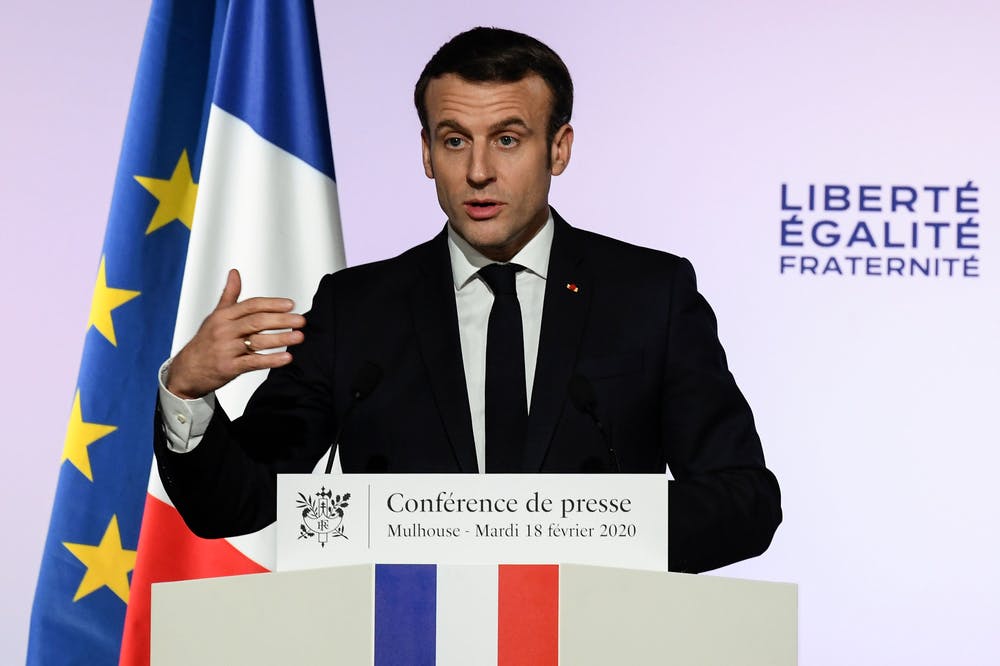Macron comfortably ahead in French polls, Marine Le Pen closes gap

French President Emmanuel Macron comfortably leads in opinion polls, less than a week before Presidential elections
For long, France has been seen as amongst the most ‘socialist’ States in the western world and the anchor of socialism in European Union, with its relatively generous social security rules as well as the infamous unions and their numerous strikes and protests that have often brought the country to a grinding halt.
However, as France prepares to vote for its next President next Sunday, there is not a single socialist or left-wing candidate in the electoral race, which has dramatically shifted to the right and even hard right as two far right candidates figure in the top 5 contenders for the position currently held by Emmanuel Macron, while just one candidate from far left makes it to the top five.
A recent poll put Macron put comfortably ahead in the race at 27 pc, while his principal opponent is Marine Le Pen, leader of the far right Rassemblement Nationale, who is placed second at 20 pc. The only candidate from the left half of the spectrum is Jean Luc Melenchon, the leader of extreme-left La France Insoumise, who has astounded political pundits by raising his support to 15 pc, nearly double of where he was barely six months ago. Two other rightwing candidates figure in the top five, both with 10 pc support. One is Eric Zemmour, a vitriolic, far-right writer, while the other is centre-right candidate Valerie Pecresse, who has tried to revive a moribund and dispirited Republican Party into life, though she has faced more detractors and opponents from within the party than outside.
Socialist issues top voters’ priorities
Though socialists or left wing may not be anywhere on the scene as contenders, paradoxically, many of the issues raised by the socialists or Greens, figure in the top concerns of the French voters in this election. For instance, the top concern is of course health, coming on the back of a pandemic that ravaged even the French healthcare system and brought it to the breaking point on numerous occasions in the past two years.
The other main worries of the French almost all read like a socialist wish list or poll manifesto. Social security, purchasing power, pensions, education, employment, inequality, environment and so on. The only issues of the right or the far right are terrorism, immigration and French identity.
So, why are the French voters buying into the candidates least likely to address their concerns? This is mainly because the political landscape in France changed dramatically in 2017 when Macron was elected. During the campaign, presenting himself as a completely atypical politician, Macron had managed to attract talent from both the parties that had dominated the French politics since the end of the second world war – the Socialists and the Republicans, with the far right Front Nationale being the third relevant player in elections.
Macron’s early appeal led to a near-total decimation of both the key parties that continued to drift over the next few years directionless, mainly due to the absence of one towering leader. Instead, both the parties had nearly a dozen candidates fighting for the mantle, even though none of them had any kind of national presence or political charisma needed to win elections.
Last year, the centre-right Republicans seemed to have gotten their act together finally, as Valerie Pecresse won the party’s primary for the presidential elections. Since her elections, Pecresse steadily increased her appeal and rose to third place with a relatively decent 17 pc share in the opinion polls in December 2021. However, since then her campaign has seen a complete meltdown as her own party leaders refuse to support her, instead opting for others, most notably former President Nicholas Sarkozy who preferred to back an obscure candidate over that of his own party.
Splintered Socialists
The centre-left, notably the Socialist Party continues to be adrift, splintered, leaderless and directionless as nearly half a dozen candidates try to claim the leadership, even though their support base at national level ensures that none of them is likely to finish even in top 5 in the elections.
Supporters of the left are exasperated by this scenario and several reports suggest that the left supporters are desperate to see their leadership unify and present a serious challenge in the elections. However, their voices don’t seem to have reached the squabbling leaders.
In many ways, it is too late. With less than a week left before the first round takes place, on April 10, even if by some miracle the parties on the left, especially the Socialists, managed to find one candidate to support and present as the unified left candidate, there is just too little time left for the candidate to conjure a programme that would appeal to the various other pretenders to the throne and present a unified manifesto that would get them back into the game. Thus, chances are that 2022 would see the first presidential election in eight decades, if not longer, where the Socialists are not only absent from the list of main contenders but would also struggle to feature significantly in the also-ran category.
That is indeed a sad commentary on a country that has long prided itself, with some justification, as the flag bearer of an equitable and accommodating society, with robust social security net for the under privileged.
The demise of the French Socialist Party could not have come at a worse moment as the poor and the underprivileged not only in France, but in countries around the world, are struggling to emerge from the pandemic that has taken a particularly bad toll among them, leading to a spike in inequality as the income of the wealthiest quintile in the world has risen sharply during the pandemic, while the poor have lost significantly.









